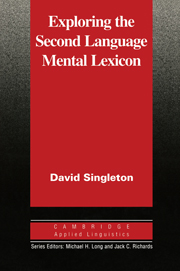Book contents
- Frontmatter
- Contents
- Series editors' preface
- Foreword
- Acknowledgements
- I INTRODUCTION AND PROLEGOMENA
- II RESEARCH REVIEW
- 2 Lexical development: an overview
- 3 Modelling the lexicon
- 4 The L2 mental lexicon: a law unto itself?
- III EVIDENCE FROM THE TRINITY COLLEGE DUBLIN MODERN LANGUAGES RESEARCH PROJECT
- IV CONCLUSION
3 - Modelling the lexicon
Published online by Cambridge University Press: 05 October 2012
- Frontmatter
- Contents
- Series editors' preface
- Foreword
- Acknowledgements
- I INTRODUCTION AND PROLEGOMENA
- II RESEARCH REVIEW
- 2 Lexical development: an overview
- 3 Modelling the lexicon
- 4 The L2 mental lexicon: a law unto itself?
- III EVIDENCE FROM THE TRINITY COLLEGE DUBLIN MODERN LANGUAGES RESEARCH PROJECT
- IV CONCLUSION
Summary
In Chapter 2 we looked at the question of how lexis is acquired. In the present chapter we turn our attention to the equally fascinating issue of how the lexis that is acquired is managed; in other words, we shall be considering the structure of the lexical storage system and the ways in which that system is accessed under different conditions. We shall also be looking at lexical processing within two broader theoretical frames of reference – respectively, the modularity hypothesis and connectionism.
The present chapter concerns itself mostly with research which does not have a specifically L2 or bilingual focus. However, in research relating to the L2 mental lexicon the same kinds of organizational and operational issues arise as in L1-focused research, the difference being that in the L2 case they are further complicated by questions having to do with precisely the fact that more than one language comes into the picture. These latter questions – (1) the degree to which the L2 lexicon resembles the L1 lexicon and (2) the degree to which and ways in which the L2 lexicon interacts with the L1 lexicon – will be addressed in Chapter 4. With regard to (1), we have already seen in Chapter 2 that there are some similarities between the challenges posed by, respectively, L1 lexical acquisition and L2 lexical acquisition; and we shall see in Chapter 4 that such similarities extend into the operational sphere. We can therefore take it that most of what is said in the present chapter in respect of L1 lexical processing is also relevant to L2.
Information
- Type
- Chapter
- Information
- Exploring the Second Language Mental Lexicon , pp. 83 - 129Publisher: Cambridge University PressPrint publication year: 1999
